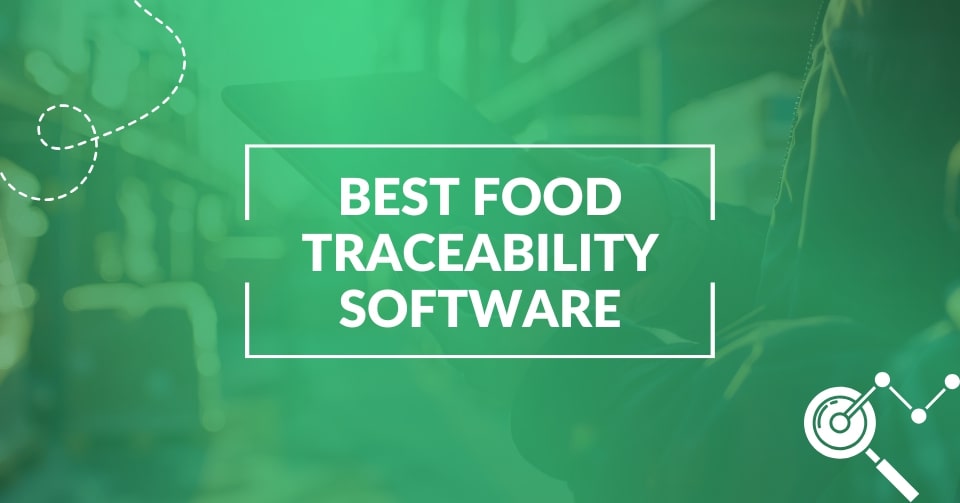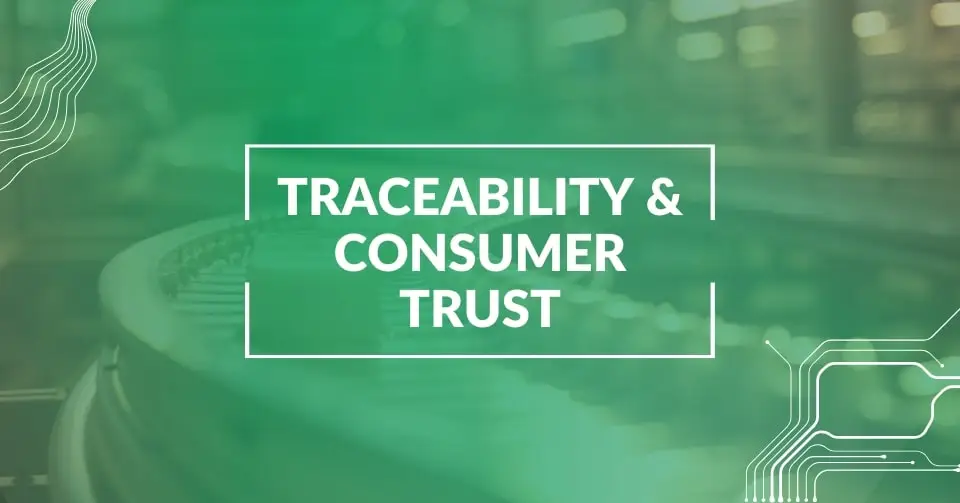Food traceability is a crucial element in ensuring food safety, supply chain transparency, and operational efficiency. With tighter regulations like FDA FSMA Rule 204 and global food safety initiatives such as GFSI and its benchmarked schemes, food manufacturers face increasing pressure to track ingredients, monitor production processes, and document every critical event along the supply chain. Falling short of these expectations can have serious consequences.
A single food recall can cost more than $10 million in direct losses, not to mention the long-term damage to consumer trust and brand value. Companies that lack effective traceability tools may struggle to isolate issues quickly, leading to broader recalls and reputational harm that can take years to repair.
Choosing the right food traceability software is no longer just about meeting regulatory requirements. It is a key part of protecting your brand and business continuity.
Not sure which platform fits your operation? Keep reading to explore some of the most capable food traceability solutions that can help you meet your safety, compliance, and quality goals.
What Is Food Traceability Software?
Traceability software is a digital solution that helps build an efficient system and improves transparency in the food supply chain.
Using a food traceability solution, food businesses will promptly respond to food safety issues and maintain regulatory standards, including FSMA compliance.
How Does Food Traceability Software Work?
Food traceability software helps manufacturers, processors, distributors, co-packers, cetral kitchens and retailers track and trace the materials and ingredients in their food.
The software helps you spot supply chain issues and isolate the problem’s source, such as a contaminant.
This way, you prevent further problem development. Moreover, you create a document trail to ensure food safety, compliance, and quality.
Why Is Food Traceability So Important?
You should be aware that food traceability and recall management are some of the most critical aspects of food safety. Suppose one of the ingredients of a food product ends up being mislabeled or contaminated with pathogenic bacteria, chemicals, or physical hazards.
In that case, it’s crucial to make the buyer and end consumer aware of the recall and remove possibly dangerous food from the shelves and consumers’ mouths.
Our Criteria for Evaluating the Software Solutions
After reviewing different food traceability solutions, our expert team focused on features that drive safety, compliance, and operational efficiency.
Here are the key criteria we considered to identify the best solutions for your business:
- Key Features: Core capabilities for food traceability, such as lot tracking, recall management, data integration, and real-time monitoring.
- Platform Support: You need multi-platform support to manage traceability tasks from any device.
- Compliance & Regulatory Support: Ability to meet industry standards like FDA, FSMA, HACCP, and GFSI. Regulatory compliance is crucial to align with food safety laws and maintain consumer trust.
- Support: Comprehensive support ensures users can resolve issues promptly and fully use the software.
- Integration: Integrating with other systems (e.g., ERP, inventory, and accounting) facilitates data consistency, enhancing operational efficiency.
What Are Some of the Best Food Traceability Software Solutions?
When it comes to food manufacturing traceability software, there are a lot of options out there.
Here’s an overview of 10 food traceability software solutions that can help you ensure the safety and quality of your products.
1. FoodReady
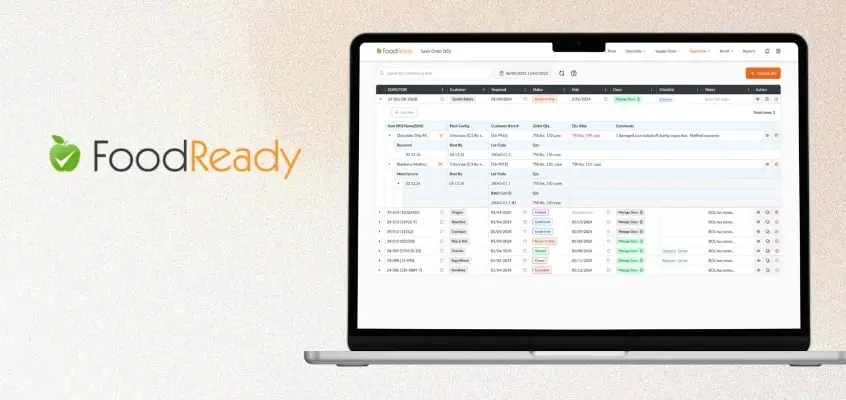
Pricing: Contact FoodReady for more information
Deployment: Cloud
Apps: Web, iOS, and Android
Why use FoodReady?
FoodReady food traceability software is an excellent solution for managing your lot traceability with shipping and receiving logs. These logs are also associated with sales and purchase orders to track the inventory coming in from suppliers and going out to customers.
Develop recall plans and practice mock recalls, which can be triggered by product complaint tracking. The recall system is associated with lot numbers stored in the inventory database.
In addition, FoodReady’s all-in-one design means you can oversee everything from incoming ingredients to outgoing shipments on one platform. It’s built with the latest regulations in mind (like FSMA 204), helping you stay compliant effortlessly. With real-time monitoring and analytics, any anomalies in your supply chain are flagged immediately, letting you act fast before issues escalate. The system is also scalable and user-friendly, making advanced traceability accessible for small producers and large manufacturers alike.
The partnership with GS1 US brings even more benefits, such as verifiable product data and easier supply chain management in compliance with regulations.
FoodReady Features:
- Recall Plan & Mock Recall Management – Create, test, and refine recall plans and conduct mock recalls to reduce response time and risks during recalls.
- Product Complaint Tracking – Capture customer complaints for trend analysis and corrective actions.
- Receiving & Shipping Lot Traceability and Sales Order and Purchase Order Tracking – You can link each shipment to a lot and its related orders to ensure traceability and quick identification in case of a product issue.
- Receiving GS1 Barcode Scanning – FoodReady enables GS1 barcodes to log product data automatically at receiving points.
- Inventory Management With Traceability – Ensure inventory accuracy by monitoring stock levels and lot history.
- Batch Management With Traceability – Track ingredients and materials through production batches to support traceability and food safety standards.
- Traceability Data Management – Benefit from centralized and structured traceability data.
- Supply Chain Management – Get comprehensive control and visibility over supplier performance, logistics, and product flow.
- Analytics and Reporting – Get real-time actionable insights from traceability and quality data, enabling data-driven decisions and continuous improvement.
- Regulatory Compliance – The software supports compliance with the FDA, FSMA, USDA, and global food safety standards.
- Secure Online Platform – Businesses can work safely with cloud-based secure access.
- Real-time Monitoring – Benefit from real-time tracking, improving response time to deviations or bottlenecks.
- Audit Preparation Tools and Services – Organize documentation, procedures, and historical data to ensure audit readiness and reduce stress during regulatory inspections.
Best for: Food manufacturers and processors of any size looking for an integrated, all-in-one traceability and compliance solution.
2. IBM Food Trust
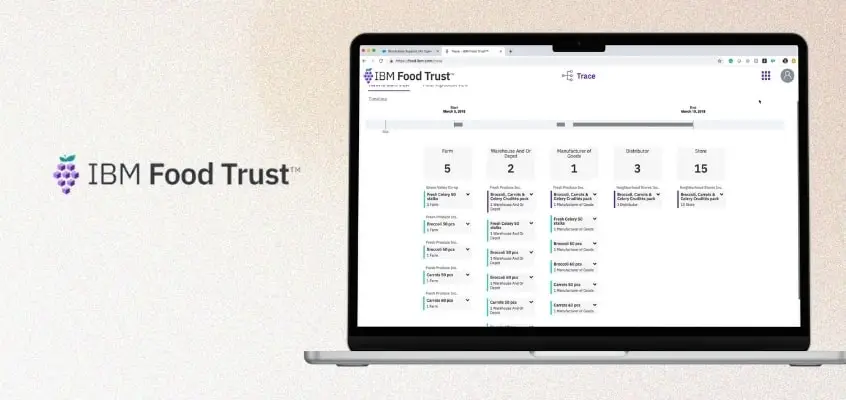
Pricing: Contact IBM Food Trust for more information
Deployment: Cloud
Apps: Web
Why use IBM Food Trust?
IBM Food Trust provides end-to-end traceability throughout the supply chain, allowing you to track products easily using identifiers like Product ID, Lot Number, or Purchase Order Number. To ensure security, data owners can control access to their data by selecting specific policies.
For enhanced trust, IBM Food Trust leverages blockchain technology to create an immutable record of every transaction from farm to store. This shared platform is used by many global retailers and suppliers, which means you can easily collaborate with trading partners and pinpoint issues in seconds. Such network-wide visibility not only speeds up recalls but also helps verify product provenance and freshness, bolstering consumer confidence.
IBM Food Trust Features:
- Automation of Traceability Data Exchange
- End-to-end visibility and Transparency for the Supply Chain
- Validate Quality Provenance with Food Trust Network
- Streamlined Recall Management Solution
- Establish a Secure, Distributed Ledger Technology Platform
Best for: Large retailers, distributors, and global food brands requiring a secure, blockchain-based traceability network.
3. SAP
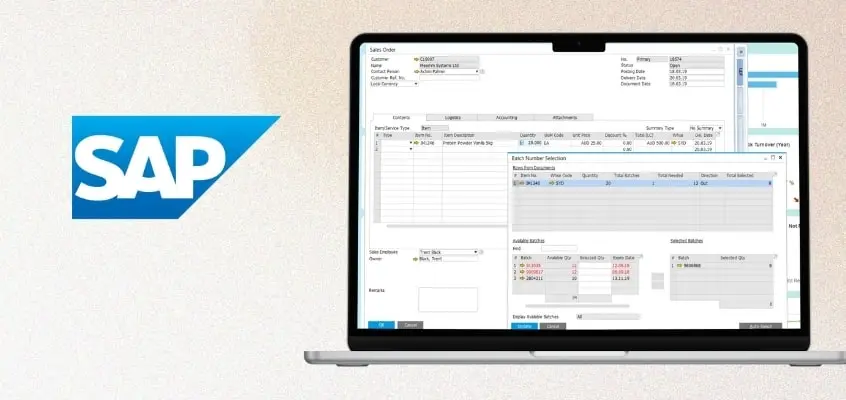
Pricing: Contact SAP for more information
Deployment: Cloud
Apps: Web
Why use SAP?
SAP Business Network Material Traceability empowers food producers with comprehensive traceability across multi-tier supply chains. Tracking products from farm to shelf enables precise, efficient recalls, sustainability insights, and compliance with industry standards.
Real-time alerts, integration with SAP, and data-sharing capabilities foster transparency, reduce waste, and enhance consumer trust in food safety.
As part of the SAP ecosystem, this traceability solution integrates seamlessly with core ERP and supply chain processes. Companies benefit from unified data across procurement, production, and distribution, meaning traceability information is available wherever it’s needed. The platform can also leverage SAP’s advanced analytics and IoT sensor data (e.g., temperature readings) to predict and prevent issues before they impact consumers. With enterprise-grade scalability, it’s well-suited to multinational food and beverage operations that require strict compliance control and performance.
SAP Features:
- Product Tracking Across the Entire Supply Chain
- Advanced Lot Tracking
- Expiration Date Tracking
- Compliant Recall Capabilities
- Effective Analysis and Reporting
Best for: Enterprise-level food and beverage companies (especially existing SAP users) that need deep traceability integration across their supply chain.
4. FoodLogiQ Connect
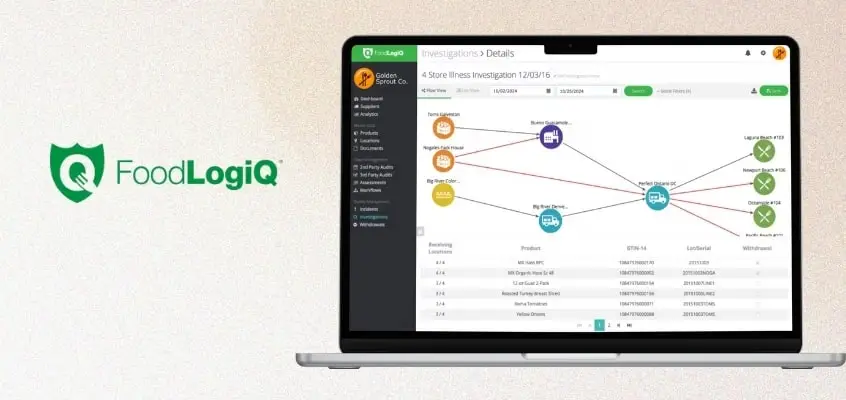
Pricing: Contact Trustwell for more information
Deployment: Cloud
Apps: Web, iOS, and Android
Why use FoodLogiQ Connect?
FoodLogiQ Traceability by Trustwell empowers food companies to trace products from farm to fork, ensuring FSMA 204 compliance. The software captures critical tracking event (CTE) data, enabling lot-level, GS1-aligned traceability.
Real-time alerts streamline recalls, and mobile-accessible reporting enhances audit readiness. FoodLogiQ supports grocers, manufacturers, and distributors in building supply chain transparency and consumer trust.
Additionally, FoodLogiQ offers a collaborative platform where suppliers and customers can share traceability data, making it easier to gather Key Data Elements (KDEs) required by regulators. Its intuitive mobile app lets field teams capture data on the go. FoodLogiQ helps reduce the manual workload of compliance and instills confidence that your farm-to-fork tracing is always accurate.
FoodLogiQ features:
- End-to-End “Whole Chain” Visibility
- FSMA 204 Compliance (CTE & KDE Capture)
- Surgical (Lot-Level) Recall Management
- GS1 Standards Integration
- Root Cause Analysis & Incident Linkage
Best for: Grocers, food manufacturers, and distributors seeking a farm-to-fork traceability platform aligned with FSMA 204 requirements.
5. FoodChain ID Traceability
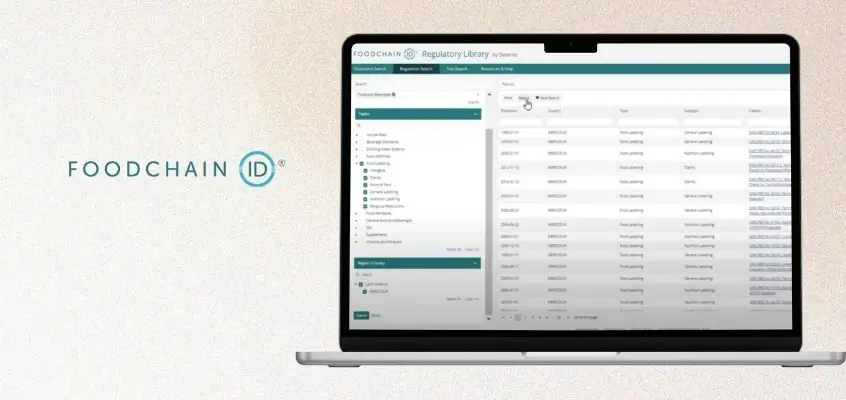
Pricing: Contact FoodChain ID for more information
Deployment: Cloud
Apps: Web
Why use FoodChain ID Traceability?
inSYTE™ by FoodChain ID helps retailers, suppliers, growers, finished food manufacturers, and others create and maintain a traceable global supply network.
Their cloud-based platform enables farm-to-fork and seed-to-shelf tracing, ensuring regulatory compliance on product traceability and supply chain monitoring.
It supports integration with quality certifications and lab testing info, linking each product’s traceability record with its safety credentials. This means if a contamination or compliance issue arises anywhere from farm to factory, the system can quickly isolate the affected inputs and notify the right partners. FoodChain ID’s deep expertise in global food standards underpins the software, making it a reliable choice for those needing both end-to-end traceability and peace of mind on regulatory compliance.
FoodChain ID Traceability Features:
- End-to-End Traceability Solution
- Lot Tracking Capabilities
- Automated Data Exchange with Multiple Stakeholders
- Quality Assurance Tools and Reports
- Batch Management and Recall System
Best for: Retailers, ingredient suppliers, growers, and food manufacturers operating across a global supply chain who need a compliance-focused, end-to-end traceability platform.
6. Sphera (Formerly SupplyShift)
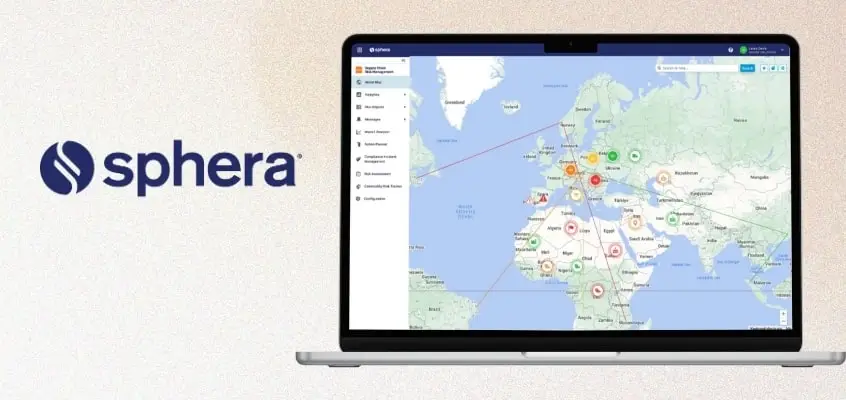
Pricing: Contact Sphera for more information
Deployment: Cloud
Apps: Web, Android, Windows, iOS
Why use Sphera?
Sphera brings transparency and resilience to supply chain management. Its traceability tools help businesses capture Scope 3 emissions, monitor risks, and score suppliers on sustainability metrics.
It allows organizations to map out their entire supplier network and collect key ESG data (like carbon footprint or labor standards compliance) alongside traditional traceability information. This dual focus means you can track products and also ensure your supply chain meets corporate social responsibility goals.
For brands that value transparency and sustainability, Sphera provides insights to identify weak links, improve supplier performance, and confidently report on progress.
Sphera Features:
- Track Products in Real-Time
- Automatically Exchange Data With Partners
- Manage Recalls and Traceability Across the Supply Chain
- Track Material Sourcing and Provenance of Ingredients
- Monitor Quality Assurance Throughout the Entire Process
Best for: Food companies with complex, multi-tier supply chains that prioritize sustainability and ESG tracking in addition to standard traceability.
7. TraceGains
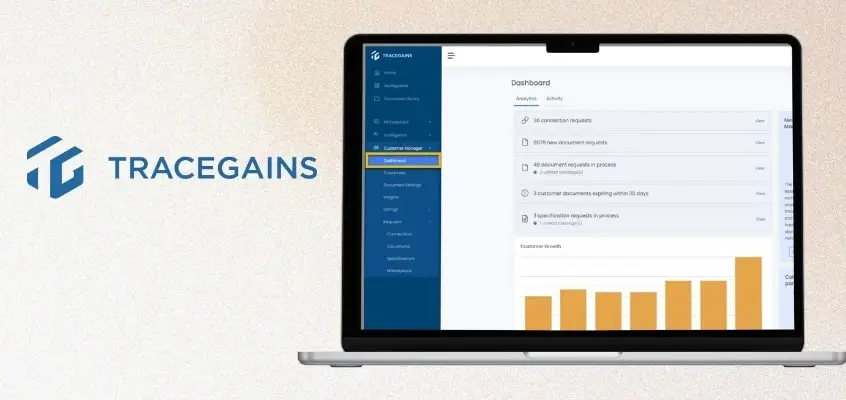
Pricing: Contact TraceGains for more information
Deployment: Cloud
Apps: Web, Windows
Why use TraceGains?
TraceGains, now integrated with Veralto, is invaluable for FSMA compliance and ingredient traceability in food manufacturing.
It helps monitor Critical Tracking Events (CTEs) and supplier data, creating a connected digital system that simplifies compliance and safety across the supply chain.
One key benefit of TraceGains is its network-driven approach: the platform connects you with an ecosystem of ingredient suppliers, making it easy to collect and update compliance documents or specifications from vendors. Instead of chasing paperwork, your team can rely on TraceGains to automatically flag missing allergen info, expired certifications, or high-risk ingredients before they become problems.
In short, TraceGains streamlines both quality management and traceability, saving time while strengthening your supply chain’s integrity.
TraceGains Features:
- Real-Time Tracking Capabilities
- Lot Tracking of Products
- Automated Data Exchange with Business Partners
- Integrated Recall and Compliance Management
- Quality Assurance Tools and Reports
Best for: Mid to large food manufacturers and brand owners that deal with many suppliers and need a traceability system integrated with supplier compliance management.
8. Infor Supply Chain Management
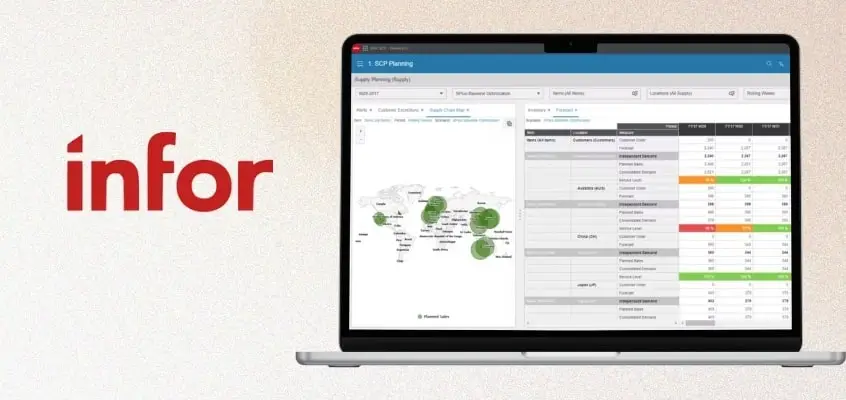
Pricing: Contact Infor Supply Chain Management for more information
Deployment: Cloud
Apps: Web, iOS, Android, Windows
Why use Infor Supply Chain Management?
Infor CloudSuite Food & Beverage is built to meet the complex traceability and compliance needs of today’s food companies.
With capabilities to track ingredients and monitor every stage of the supply chain, this cloud solution enhances product safety, improves yield, and shortens Time to Market. Real-time data visibility and AI tools make it easier for F&B brands to respond swiftly to quality concerns while optimizing processes for consistent results.
Infor Supply Chain Management Features:
- Real-Time Inventory Tracking
- Automated Data Exchange with Partners
- Lot and Batch Traceability to Monitor Quality Assurance
- Regulatory Compliance Monitoring
- Streamlined Recall Management Solution
Best for: Large food and beverage enterprises (or rapidly growing ones) that want a fully integrated, ERP-based traceability and supply chain management solution.
9. FoodDocs
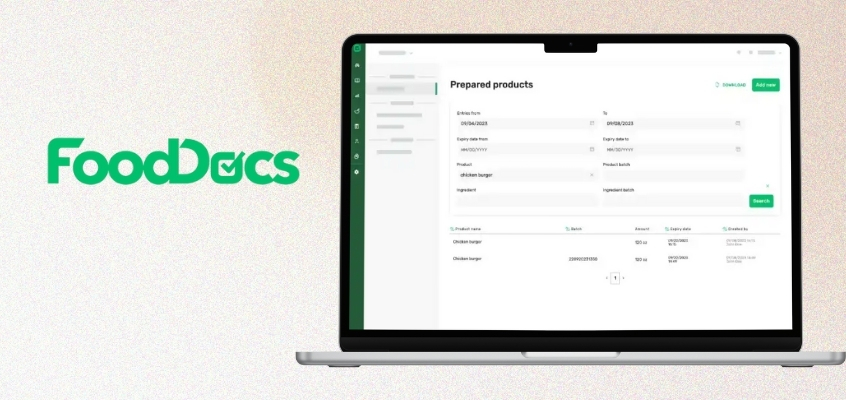
Pricing: The Professional plan is €250/month (~$293) for 5 users if billed annually.
Deployment: Cloud
Apps: Web, iOS, Android
Why use FoodDocs?
FoodDocs is an AI-driven food safety platform designed to help food businesses of all sizes streamline compliance, manage records, and ensure end-to-end traceability. The software automates the creation of food safety documents, tracks product batches in real-time, and ensures FSMA 204 readiness. Built for speed and accuracy, FoodDocs is especially beneficial for fast-paced operations like central kitchens, manufacturers, and food distributors.
FoodDocs supports cloud deployment and comes with mobile functionality, making it easy to manage traceability data on the go. Its AI-powered features reduce manual work and make it possible to generate food safety plans, track ingredients, and document Critical Tracking Events (CTEs) with minimal effort. The solution is trusted globally and supports compliance with major food safety standards, including HACCP, GFSI, SQF, and FSMA 204(d).
FoodDocs Features:
- End-to-end batch traceability with digital lot tracking
- AI-generated food safety plans and smart documentation
- Real-time monitoring and alerts for product movements
- Traceability logs for receiving, production, and distribution
- Compliance support for FSMA, SQF, BRCGS, HACCP, and GFSI
- Custom workflows for food producers, manufacturers, and caterers
Best for: Central kitchens, meal kit companies, and ready-to-eat food producers looking for a quick-to-implement, all-in-one traceability and food safety compliance tool.
10. Farmsoft
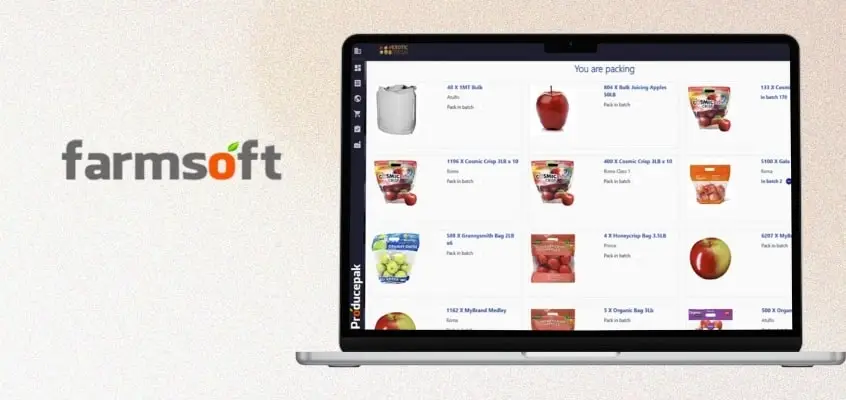
Pricing: Contact Farmsoft for more information
Deployment: Cloud, On-premise
Apps: Web, iOS, Android
Why use Farmsoft?
FarmSoft’s traceability tools are well-suited for agricultural operations focused on compliance.
With QR codes for tracking products from farm to table and support for USDA and HACCP standards, the platform offers real-time visibility and simplified inventory management. It could be valuable for those seeking greater efficiency and customer trust.
And because it supports compliance with farming standards like Good Agricultural Practices (GAP) and USDA audits, FarmSoft makes it easy to produce the records and reports that buyers and inspectors demand from farm suppliers.
Farmsoft Features:
- Real-Time Traceability
- Automated Data Collection & Record Keeping
- Recall Management & Notification
- Lot & Batch Code Scanning
- Auditing, Reporting & Analysis Tools
- QR Code and RFID Traceability
- Blockchain Traceability Option
- Inventory Management with FIFO & Barcode/RFID
Best for: Fresh produce farms, packers, and agribusinesses seeking farm-to-fork traceability with strong USDA/HACCP/GAP compliance support.
Comparisson Table of Food Traceability Solutions
These 10 food traceability solutions are designed to help food companies ensure product safety, comply with FDA regulations, and help you pass a 3rd-party audit like SQF, BRC, and FSSC 22000.
Here is a comparison table highlighting some key aspects of each traceability solution.
| Software | Deployment | Trial / Demo | Customer Support | Pricing |
|---|---|---|---|---|
| FoodReady | Cloud | Demo | Dedicated Support, Phone, Email, Knowledge Base | Contact for pricing |
| IBM Food Trust | Cloud | Trial, Demo | Chat, Ticket | Starting from $2000/month |
| SAP | Cloud | Demo | Dedicated Support, Contact | Contact for pricing |
| FoodLogiQ Connect | Cloud | Demo | Phone, Email, Ticket, Knowledge Base | Contact for pricing |
| FoodChain ID Traceability | Cloud | Demo | Phone, Email, Ticket | Contact for pricing |
| SupplyShift (Sphera) | Cloud | Demo | Chat, Phone, Email | Contact for pricing |
| TraceGains | Cloud | Demo | Ticket | Contact for pricing |
| Infor Supply Chain Management | Cloud | Demo | Chat, Portal, Phone | Contact for pricing |
| FoodDocs | Cloud | Trial, Demo | Chat, Email, Knowledge Base | The Professional plan costs $293/month |
| FarmSoft | Cloud, On-premise | Trial, Demo | Dedicated Support | Basic package starts at $360 per year for a single user |
How To Implement Traceability Software?
First, your team must thoroughly assess your current operation and determine where tech can add the most value. It could be tracking raw materials, monitoring finished goods, or responding to potential recalls.
Involve cross-functional teams early on to ensure every department understands how traceability impacts their workflow. The teams’ contributions would smooth out the integration phase, especially when aligning new software with existing inventory or ERP systems.
Employee training is key to successful implementation. Start by identifying “traceability champions” from each department. These are team members who receive advanced training and can support others. Create hands-on sessions focusing on:
- Logging product information
- Tracking shipments
- Real-time data
- Purchase management
What about follow-up questions, easy-to-follow guides, or cheat sheets?
Well, as long as it reinforces learning, everything is acceptable.
Also, as your traceability system improves, consider ongoing, small refresher sessions every quarter to keep skills sharp and introduce new features.
Keep in mind that real-time data is only as reliable as the information entered, so emphasize the importance of precise entries. For that reason, your company needs to establish best practices by setting clear guidelines around data entry and reporting accuracy.
With a well-planned setup and committed training program, your team will be well-prepared to leverage traceability software for improved business operations.
9 Key Food Traceability Software Benefits for Manufacturers
Food manufacturers want to know more about the solution’s benefits when choosing food traceability software.
However, you can be 100% sure food traceability software has various advantages (beyond improved traceability, obviously) that include:
1. Ensure Regulatory Compliance With Food Traceability Software
The FDA FSMA 204 compliance date is approaching, and food traceability software can help you meet the established traceability recordkeeping requirements.
The solution can automatically generate reports and other documents and store them in the cloud, making them easily accessible and manageable.
Traceability software’s features help you prepare for food safety audits such as SQF, BRC, etc., stay compliant with regulations, and reduce non-compliance risks.
2. Food Traceability Software Enhances Quality Control and Food Safety
Food safety and quality are the fundamental aspects of food manufacturing, and businesses must establish a proactive approach to handling food safety risks and ensuring high product quality.
A great benefit of traceability software for manufacturing is that it helps prevent low-quality and hazardous foods from reaching the consumer.
The solution lets you track, spot, and quickly eliminate contaminated products, avoiding foodborne diseases.
3. Become Recall-Ready With Food Traceability Software
Recalls are scary and undesirable because they are expensive and undermine your reputation. However, food traceability software helps avoid them or make them more manageable.
The solution gives you the visibility you need to react to recalls swiftly.
Indeed, it will help you catch the issue in the supply chain, withdraw the affected batch, and prevent further contamination.
To learn more, read our detailed guide on managing FDA recalls.
4. Food Traceability Software Saves Your Time
The software automates the processes, helping you do regular and repetitive tasks faster, create traceability logs in seconds, generate documents, and access the system in no time, saving you precious time.
As a result, food traceability software helps you and the team focus on other essential tasks without scattering their attention on routine tasks.
5. Achieve Complete Transparency in the Food Supply Chain
The software tracks the movement of products in the food supply chain, increasing awareness of what is happening.
It also integrates with other systems and technologies, such as food ERP and IoT devices, to give you a more holistic view of the situation in food production.
6. Revolutionize Inventory Management With a Traceability Solution
Food traceability software enables real-time ingredient and product tracking, helping you control stock levels and expiration dates.
You will be able to prevent overstock, reduce waste, and optimize the usage of perishable products.
With the inventory management feature, the software will help you save money, minimize spoilage, and improve efficiency and resource utilization,
7. The Software Enables Supply Chain Optimization
Food traceability software helps achieve visibility, identify bottlenecks, and optimize processes overall.
Moreover, the software streamlines collaboration with suppliers and shortens the response time to disruption and market demands.
An automated solution like food traceability software helps you digitize and streamline operations, establishing better collaboration and work processes in the supply chain.
8. Food Traceability Software Helps Boost Operational Efficiency
You can significantly automate and optimize the production processes with food traceability software.
The solution eliminates manual recordkeeping, improves data exchange and decision-making, and reduces labor and administrative costs.
Properly implemented, food traceability software will significantly streamline operations, improving efficiency.
9. Traceability Software For Brand Reputation and Business Growth
Food traceability software helps you create a quality product to win customers’ trust and strengthen your brand name.
In addition, you’ll be able to enter new markets where traceability is a must and will overtake your competitors in your current market.
The more serious your approach to food safety, company efficiency, and compliance regulations is, the more successful and reputable you are.
3 Common Challenges in Food Traceability Software Implementation
While food traceability platforms offer valuable benefits, companies must navigate several challenges to implement them successfully.
Costs
Cost is often a primary concern, especially for small to mid-sized businesses. Some solutions are priced at tens of thousands of dollars and require additional customization fees.
Complex Implementation Process
Beyond cost, implementing a new solution demands time and effort, as workflows need adapting and staff training becomes essential.
Security
Data security is another critical factor; software handling sensitive information must have robust encryption and access controls to prevent breaches. Addressing these hurdles from the start can help companies achieve a smoother integration and avoid costly setbacks.
Why Is Food Traceability Software Essential for Meeting Regulatory Standards?
Meeting regulatory standards, such as SQF certification, requires rigorous food traceability.
Consider companies like True Essence Foods, which prioritize clean, natural ingredients and sustainable methods. For them, traceability solutions aren’t just helpful. They’re essential for maintaining transparency and meeting regulatory and environmental goals.
Using FoodReady’s software, True Essence Foods established real-time tracking for ingredient sources and product movement, which is critical for SQF compliance. This solution made it simple to document batch data accurately and easily access records during audit processes.
“The traceability FoodReady provided with recording, tracking, and the ability to search historical data was excellent to aid in our SQF goal.”
Built-in tools like task managers and checklists streamlined team operations and cut costs by reducing the need for additional hires as they scaled. For companies with high standards, robust traceability software enhances both compliance and consumer trust.
It’s Your Turn
No matter which food manufacturing traceability software system you choose, it’s essential to ensure that your products remain safe and compliant with all regulations. The right food traceability platform can help you maintain the safety and quality of your products while streamlining processes like recalls, lot tracking, data sharing, and more.
One of these food traceability solutions, like FoodReady food manufacturing traceability software, can help you with food traceability and recall management, ensuring that your customers receive safe, high-quality products every time. With the right software tools, you can be confident in keeping your business running safely and smoothly.
A robust food traceability platform is essential for meeting the stringent requirements of the US Food and Drug Administration (FDA)’s Food Safety Modernization Act (FSMA).
It allows you to track each ingredient at every supply chain step and quickly and easily detect issues.
The FDA requires that an effective food recall plan be in place before a product reaches consumers. This means that manufacturers must have detailed records of their suppliers, customers, and all transactions between them.
Having reliable traceability software provides the visibility needed to comply with FSMA requirements and helps ensure consumer safety by allowing for faster recalls when issues arise.
Food handlers can use food traceability technologies like IoT devices, blockchain technology, or radio-frequency identification (RFID).
The Food and Drug Administration defines traceability as tracking & tracing the movement of food products throughout the supply chain, backward and forward.
The software creates a robust ingredient traceability system that will help track allergens and allergen-related data. Additionally, it enables better visibility, helping manufacturers catch and isolate allergens and contaminated products on time.
Cloud-based food traceability software solutions are more flexible and scalable and perfectly fit multi-location or remote businesses searching for agility. On-premise food traceability solutions are hosted locally and can provide more security.
Food traceability solutions help minimize food fraud risks by enabling real-time product tracking, detailed documentation, and enhanced transparency.
With the food traceability software, you can detect mislabeling, counterfeiting, and other fraudulent activities.
You should look for features like batch management, lot tracking, document control, analytics and reporting, barcode scanning, etc. Apart from that, review the case studies of the software provider, check reviews, and compare prices.
Modern software solutions implement advanced encryption, user authentication, and secure access controls. Moreover, the providers often adhere to cybersecurity compliance frameworks.
Any branch of the food supply chain can find the software helpful and benefit from it.


